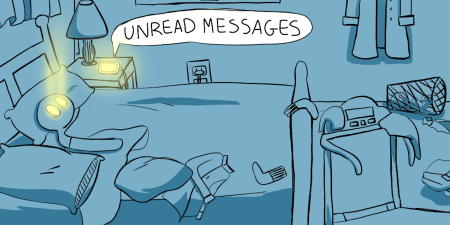Abstract
The internet and related media play key roles in education, work, and leisure. It could be argued that people have better interpersonal interactions because of social media, which could reduce loneliness. But documented internet use patterns suggest that the internet increases loneliness. Studies conducted prior to and during the COVID-19 pandemic demonstrate an association between what’s called “internet addiction” and loneliness, although findings vary with participant demographics and frequency and types of internet use. There is a need to conduct longitudinal research to determine the direction of causality and whether what we define as “balanced” internet behavior positively affects well-being.
Loneliness and Media
Loneliness can be defined as the feeling we get when our need for rewarding social contact and relationships is not met. There are many factors that can increase loneliness, a recent example being the reduced social contact caused by the COVID pandemic. Loneliness is associated with poor health; it elevates stress,1 which can cause mental health problems that in turn can influence physical health.2 One factor associated with loneliness is internet use. Internet use covers various behaviors, with some being considered positive (eg, the use of the internet in education and work) and others (eg, social media use, gambling, viewing pornography)—especially when excessive—being associated with addiction3,4 that can undermine well-being. Internet addiction is compulsive internet use, which manifests as addiction symptoms and withdrawal signs when the user is not connected to the internet, as well as impairment of life activities, including those performed at work and at home. Problematic internet use is more common and is defined as internet misuse, which has a general negative impact on the internet user’s life.5
Debate about whether the internet improves or harms participation in community life and social relationships started in the 1990s.6,7 An early study of the internet and psychological well-being found that greater internet use was associated with a decline in participants’ communication with family members, a decrease in their social circle, and an increase in depression and loneliness.6 Subsequent studies have reported similar results. An early review of research on this topic by Morahan-Martin supported 2 opposing hypotheses about the causal relation between internet use and loneliness.7 First, loneliness may be a product of excessive internet use because users invest in online relationships at the expense of real-life ones. Alternatively, lonely individuals may be drawn to online activities because they offer connectedness, companionship, and community membership. The present article aims to review the literature on the internet and loneliness to answer the question: What role does the modern internet play in alleviating or exacerbating loneliness?
Loneliness and the Internet
A search of the PubMed database using loneliness and internet as search terms retrieved 77 articles on the internet and loneliness published between 2000 and 2010 and 177 such articles published between 2011 and 2018. Another literature search using PubMed retrieved 394 articles published in 2019 or later on the topic of social isolation, loneliness, and internet use.
Cause and effect. Similar to Morahan-Martin, a 2009 study suggested that loneliness can be both the cause and the effect of problematic internet use.8 A 2021 systematic review and meta-analysis found a moderate association between internet addiction and loneliness, although most of the studies included in the review were carried out prior to the start of the COVID-19 pandemic.9 Based on a review of the literature on the relationship between internet use and loneliness, Nowland et al concluded that when the internet is used to enhance existing social relationships and develop new social connections it is a valuable tool for reducing loneliness (the “stimulation hypothesis”), but when it is used to escape from the social world and withdraw from social interactions it will increase feelings of loneliness (the “displacement hypothesis”).10 On the displacement hypothesis, lonely people who use the internet to escape from social interaction may reduce the time they spend on offline social interaction, suggesting that they need psychological support in managing their internet use to enhance existing relationships and create new ones.
Specific groups. Several review articles published after 2010 focus on specific groups, such as the elderly,11 children,12 or adolescents.13 In the case of the elderly, results show that internet communication technology may be appropriate for some individuals (eg, those with good computer literacy) but not for everyone. Future research should aim to identify those who would gain the most benefit.
How we use the internet may contribute to feelings of isolation, and perceived social isolation is positively related to problematic social media use.
Isolation induced by the COVID-19 pandemic. Internet use significantly increased during the pandemic due to the lockdown and people having to work and interact from home, with significant detrimental effects on people’s mental health.14,15 During periods of social isolation, social media identity bubbles may provide substantial social resources. However, these resources cannot shield people who are lonely from increased psychological discomfort,16 and virtual friendships have been shown to predict greater loneliness among adolescents with learning disabilities.17 Even if virtual friendships ease the emotional loneliness that comes from a lack of intimate, physical relationships for some, there is reason to believe that many of the relationships made online are little more than virtual friendships. How we use the internet may contribute to feelings of isolation, and perceived social isolation is positively related to problematic social media use.18 Although in-person interactions are still the most effective strategy to combat feelings of isolation, people may sometimes find the support they need in virtual communities.
Research has shown that loneliness increased during the pandemic. In one survey of Italian adults, respondents of all ages reported that they spent more hours using social media during the lockdown than before, with perceived loneliness being associated with both excessive social media use and anxiety,19 consistent with the findings of a survey on Chinese adults’ WeChat use.20 However, a study of middle-aged and older English adults found that those who used the internet more than once a day and for communication purposes felt less lonely than those who used the internet once a week during the quarantine, indicating that frequency of internet use is related to subjective sense of well-being.21
During the pandemic, loneliness increased among the elderly,22 and, in particular, among elderly adults with physical impairments or lack of ability to use or access technology to socialize online.23 Feelings of loneliness increase with age,24 and, among older adults, loneliness and social isolation are associated with anxiety, depression, mortality risk, and cognitive decline.25 Although internet use was shown to mitigate loneliness among the elderly in an “age-friendly” city in Taiwan during the pandemic,26 a study of internet addiction among the elderly in China during the pandemic conversely found that internet addiction can be mitigated by increasing real-life social support that lessens the feeling of loneliness among the elderly.27
There was also a rise in loneliness and mental health-related effects among children and adolescents during the COVID-19 pandemic,28 with loneliness both contributing to and exacerbating depression and anxiety in children and adolescents with preexisting mental health conditions.29 Lonely adolescents were more likely to use social media as a strategy for coping with restricted social contacts in real life.30 A study of Turkish adolescents during the pandemic showed that loneliness increases internet addiction,31 and other studies showed that internet-based addictive behaviors increased during the pandemic, negatively impacting young and adolescent internet users.32,33,34 Within this group, internet use, loneliness, and social isolation have been found to be correlated with mental health issues such as anxiety, stress, and depression.30
Our and our colleagues’ research confirms that the association between internet use and loneliness depends on the characteristics of the sample.35 In a survey of over 500 participants from Kuwait and Saudi Arabia, loneliness was found to be associated with both problematic internet use and the number of hours spent online, with younger participants reporting greater loneliness than older ones and those who reported greater loneliness frequently obtaining news about the pandemic from social media. The quality of the relationship with the person(s) with whom participants were spending their lockdown was also correlated with loneliness. In summary, the literature shows that the association between internet use and loneliness depends on the nature of the internet use and the characteristics of the user.
Next Questions
Despite the large literature on internet use and loneliness, there are many issues that require further study. For example, are there differences in the loneliness-producing effects of different internet activities? Does internet literacy have an effect on loneliness? Are cultural differences important because of differences in the availability of and attitudes toward different internet resources? What is it about online relationships that makes them less satisfying than in-person interactions? And does loneliness cause internet use or vice versa? Most studies do not show a causal relationship between internet use and loneliness but rather an association that could be bidirectional. Moreover, in research conducted during the COVID-19 pandemic, social isolation may be confounding the association between internet use and loneliness.
From an ethical perspective, one can argue that both the prevention of loneliness and appropriate use of the internet are important topics that require appropriate guidance. The specific form of this information depends on the findings from the research, and it is apparent that there are many issues to resolve before appropriate guidance can be given.
References
- Segrin C, Passalacqua SA. Functions of loneliness, social support, health behaviors, and stress in association with poor health. Health Commun. 2010;25(4):312-322.
-
Ohrnberger J, Fichera E, Sutton M. The relationship between physical and mental health: a mediation analysis. Soc Sci Med. 2017;195:42-49.
-
Park JJ, King DL, Wilkinson-Meyers L, Rodda SN. Content and effectiveness of web-based treatments for online behavioral addictions: systematic review. JMIR Ment Health. 2022;9(9):e36662.
-
Alheneidi H. The Influence of Information Overload and Problematic Internet Use on Adults’ Wellbeing. Dissertation. Cardiff University; 2019. Accessed June 27, 2023. https://orca.cardiff.ac.uk/id/eprint/121873/1/2019alheneidiphd.pdf
- Young K. Internet addiction: the emergence of a new clinical disorder. Cyberpsychol Behav. 1998;1(3):237-244.
-
Kraut R, Patterson M, Lundmark V, Kiesler S, Mukopadhyay T, Scherlis W. Internet paradox. A social technology that reduces social involvement and psychological well-being? Am Psychol. 1998;53(9):1017-1031.
- Morahan-Martin J. The relationship between loneliness and internet use and abuse. Cyberpsychol Behav. 1999;2(5):431-439.
- Kim J, LaRose R, Peng W. Loneliness as the cause and the effect of problematic Internet use: the relationship between Internet use and psychological well-being. Cyberpsychol Behav. 2009;12(4):451-455.
-
Mozafar Saadati H, Mirzaei H, Okhovat B, Khodamoradi F. Association between internet addiction and loneliness across the world: a meta-analysis and systematic review. SSM Popul Health. 2021;16:100948.
-
Nowland R, Necka EA, Cacioppo JT. Loneliness and social internet use: pathways to reconnection in a digital world? Perspect Psychol Sci. 2018;13(1):70-87.
-
Chen YR, Schulz PJ. The effect of information communication technology interventions on reducing social isolation in the elderly: a systematic review. J Med Internet Res. 2016;18(1):e18.
- Ren Y, Yang J, Liu L. Social anxiety and internet addiction among rural left-behind children: the mediating effect of loneliness. Iran J Public Health. 2017;46(12):1659-1668.
-
Taylor S, Pattara-Angkoon S, Sirirat S, Woods D. The theoretical underpinnings of Internet addiction and its association with psychopathology in adolescence. Int J Adolesc Med Health. 2017;31(5).
- Banks J, Xu X. The mental health effects of the first two months of lockdown during the Covid-19 pandemic in the UK. Fisc Stud. 2020;41(3):685-708.
-
Marshall L, Bibby J, Abbs I. Emerging evidence on COVID-19’s impact on mental health and health inequalities. Health Foundation blog. June 18, 2020. Accessed December 1, 2022. https://www.health.org.uk/news-and-comment/blogs/emerging-evidence-on-covid-19s-impact-on-mental-health-and-health
-
Latikka R, Rubio-Hernández R, Lohan ES, et al. Older adults’ loneliness, social isolation, and physical information and communication technology in the era of ambient assisted living: a systematic literature review. J Med Internet Res. 2021;23(12):e28022.
- Sharabi A, Margalit M. The mediating role of internet connection, virtual friends, and mood in predicting loneliness among students with and without learning disabilities in different educational environments. J Learn Disabil. 2011;44(3):215-227.
- Meshi D, Cotten SR, Bender AR. Problematic social media use and perceived social isolation in older adults: a cross-sectional study. Gerontology. 2020;66(2):160-168.
-
Boursier V, Gioia F, Musetti A, Schimmenti A. Facing loneliness and anxiety during the COVID-19 isolation: the role of excessive social media use in a sample of Italian adults. Front Psychiatry. 2020;11:586222.
-
Li J, Zhou L, Van Der Heijden B, Li S, Tao H, Guo Z. Social isolation, loneliness and well-being: the impact of WeChat use intensity during the COVID-19 pandemic in China. Front Psychol. 2021;12:707667.
-
Wallinheimo AS, Evans SL. More frequent internet use during the COVID-19 pandemic associates with enhanced quality of life and lower depression scores in middle-aged and older adults. Healthcare (Basel). 2021;9(4):393.
- Dahlberg L. Loneliness during the COVID-19 pandemic. Aging Ment Health. 2021;25(7):1161-1164.
- Kotwal AA, Holt-Lunstad J, Newmark RL, et al. Social isolation and loneliness among San Francisco Bay area older adults during the COVID-19 shelter-in-place orders. J Am Geriatr Soc. 2021;69(1):20-29.
-
Hajek A, König HH. Social isolation and loneliness of older adults in times of the COVID-19 pandemic: can use of online social media sites and video chats assist in mitigating social isolation and loneliness? Gerontology. 2021;67(1):121-124.
- Gorenko JA, Moran C, Flynn M, Dobson K, Konnert C. Social isolation and psychological distress among older adults related to COVID-19: a narrative review of remotely-delivered interventions and recommendations. J Appl Gerontol. 2021;40(1):3-13.
-
Ng SI, Lim XJ, Hsu HC, Chou CC. Age-friendliness of city, loneliness and depression moderated by internet use during the COVID-19 pandemic. Health Promot Int. 2023;38(3):daac040.
-
Jia Y, Liu T, Yang Y. The relationship between real-life social support and Internet addiction among the elderly in China. Front Public Health. 2022;10:981307.
- Cauberghe V, Van Wesenbeeck I, De Jans S, Hudders L, Ponnet K. How adolescents use social media to cope with feelings of loneliness and anxiety during COVID-19 lockdown. Cyberpsychol Behav Soc Netw. 2021;24(4):250-257.
- Hards E, Loades ME, Higson-Sweeney N, et al. Loneliness and mental health in children and adolescents with pre-existing mental health problems: a rapid systematic review. Br J Clin Psychol. 2022;61(2):313-334.
- Jamil A, Syed J, Kanwal S, et al. Loneliness and mental health related impacts of COVID-19: a narrative review. Int J Adolesc Med Health. 2022;35(1):21-30.
-
Sarıalioğlu A, Atay T, Arıkan D. Determining the relationship between loneliness and internet addiction among adolescents during the Covid-19 pandemic in Turkey. J Pediatr Nurs. 2022;63:117-124.
- Garfin DR. Technology as a coping tool during the coronavirus disease 2019 (COVID‐19) pandemic: implications and recommendations. Stress Health. 2020;36(4):555-559.
-
Cellini N, Canale N, Mioni G, Costa S. Changes in sleep pattern, sense of time, and digital media use during COVID-19 lockdown in Italy. J Sleep Res. 2020;29(4):e13074.
- Kovačić Petrović Z, Peraica T, Kozarić-Kovačić D, Palavra IR. Internet use and internet-based addictive behaviours during coronavirus pandemic. Curr Opin Psychiatry. 2022;35(5):324-331.
-
Alheneidi H, AlSumait L, AlSumait D, Smith AP. Loneliness and problematic internet use during COVID-19 lock-down. Behav Sci (Basel). 2021;11(1):5.



